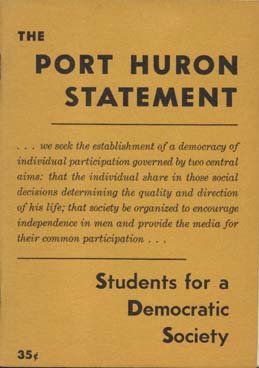We are people of this generation, bred in at least modest comfort, housed now in universities, looking uncomfortably to the world we inherit.
When we were kids the United States was the wealthiest and strongest country in the world: the only one with the atom bomb, the least scarred by modern war, an initiator of the United Nations that we thought would distribute Western influence throughout the world. Freedom and equality for each individual, government of, by, and for the people -- these American values we found good, principles by which we could live as men. Many of us began maturing in complacency.
As we grew, however, our comfort was penetrated by events too troubling to dismiss. First, the permeating and victimizing fact of human degradation, symbolized by the Southern struggle against racial bigotry, compelled most of us from silence to activism. Second, the enclosing fact of the Cold War, symbolized by the presence of the Bomb, brought awareness that we ourselves, and our friends, and millions of abstract "others" we knew more directly because of our common peril, might die at any time. We might deliberately ignore, or avoid, or fail to feel all other human problems, but not these two, for these were too immediate and crushing in their impact, too challenging in the demand that we as individuals take the responsibility for encounter and resolution.
While these and other problems either directly oppressed us or rankled our consciences and became our own subjective concerns, we began to see complicated and disturbing paradoxes in our surrounding America. The declaration "all men are created equal . . . rang hollow before the facts of Negro life in the South and the big cities of the North. The proclaimed peaceful intentions of the United States contradicted its economic and military investments in the Cold War status quo.
We witnessed, and continue to witness, other paradoxes. With nuclear energy whole cities can easily be powered, yet the dominant nationstates seem more likely to unleash destruction greater than that incurred in all wars of human history. Although our own technology is destroying old and creating new forms of social organization, men still tolerate meaningless work and idleness. While two-thirds of mankind suffers undernourishment, our own upper classes revel amidst superfluous abundance. Although world population is expected to double in forty years, the nations still tolerate anarchy as a major principle of international conduct and uncontrolled exploitation governs the sapping of the earth's physical resources. Although mankind desperately needs revolutionary leadership, America rests in national stalemate, its goals ambiguous and tradition-bound instead of informed and clear, its democratic system apathetic and manipulated rather than "of, by, and for the people."
The entire Port Huron Statement is here




















